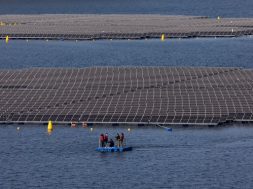
SEDA MALAYSIA : A REPORT CARD (2019) STRENGTHENS THE GROWTH OF RENEWABLE ENERGY AND ITS INDUSTRY IN MALAYSIA
PUTRAJAYA: In 2020, Sustainable Energy Development Authority (SEDA) Malaysia an agency under the Ministry of Energy, Science, Technology, Environment & Climate Change (MESTECC) continues to facilitate, promote and develop cohesive way forward for the growth of sustainable energy (SE) in the form of renewable energy (RE) and energy efficiency in Malaysia.
Net Energy Metering (NEM) 2.0
The government’s RE initiatives are bearing its fruits with SEDA Malaysia has approved a total of cumulative Net Energy Metering (NEM) programme quota of 108MW as at end of November 2019. The total of approved quota portrays positive growth of 7.8 times increment to compare with the previous three years, which only stands at 13.86MW take-up rate.
This success is largely contributed by the newly improved NEM 2.0 programme. Effective early this year, the NEM programme has been updated by adopting the true net energy metering concept, which allows excess solar PV generated energy to be exported back to the grid on a “one-on-one” offset basis. This has managed to reduce the period for Return of Investment (ROI) to a mere 3 years especially for commercial and industrial installation which are also benefited from the various tax incentive given by the Goverment.
The Cumulative NEM approved from 2016 to 2019 are as follows:-
| Year | Approved Quota |
| 2016 | 0.01MW |
| 2017 | 2.33MW |
| 2018 | 11.53MW |
| 2019 | 94.14MW |
| Total | 108MW |
In terms of category of RE Resources, the approved NEM quota are divided as follows:-
| Category | Approved Capacity |
| Domestic | 7.67MW |
| Commercial | 25.18MW |
| Industrial | 75.01MW |
| Agriculture | 0.13MW |
| Total | 108MW |
There are still huge potential for solar photovoltaic (PV) rooftop given that there are at least 4.12 million buildings with an estimated technical potential of 37,429MW in Peninsular Malaysia alone. SEDA will continue the efforts in promoting greater public participation in the NEM programme.
E-Bidding: The Way Forward For A More Competitive Price
In Q4 2018, SEDA Malaysia introduced the e-bidding system for the RE (biogas) and the e-bidding was extended to small hydro in 2019 applications under the Feed-in Tariff (FiT) scheme. The e-bidding aims to facilitate price discovery for RE generated from resources and promote healthier competition.
The average effective rate for the 1st e-bidding for Biogas in Q4 2018 stands at RM0.4055/kWh and the 2nd e-bidding in July 2019 stands at RM0.4058/kWh. This price is way lower than the effective rate of RM0.4669/kWh offered prior to the introduction of e-bidding.
This translates into a total savings on the RE Fund at RM683 million throughout the 21-year power purchase agreement period for the 2 tranches.
In December 2019, SEDA Malaysia also announced the results from its inaugural e-bidding system under the small hydro category with initial quota allocation of 160MW. However, the e-bidding has resulted in award of 176.69MW of small hydro due to price efficiency of some of the high head technologies submitted.
Fit-In-Tariff (FiT): Cancellation of Non-performing Projects
The FiT has been successful in driving the RE agenda in Malaysia over the past 8 years. As of November 2019, 10, 269 FiT applications with total installed RE capacity of 614.93 MW has achieved commercial operations in Malaysia.
SEDA, under the current government’s administration, constantly monitors the performance of the FiT projects for transparency purposes. Since May 2018, 394 projects which have not met their targeted milestones are revoked, reinstating 211MW back to the quota, estimated savings from this is about RM2.6 billion in terms of energy payment for the whole power purchase agreement period.
Renewable Energy Transition Roadmap (RETR) 2035
To further strengthen and spur the growth of clean energy, SEDA Malaysia has conducted a study on decarbonising the electricity sector. The nation’s Renewable Energy Transition Roadmap (RETR) 2035 includes the strategic roadmap to support the current government’s aspiration in achieving 20% RE target in the national installed capacity mix by 2025 (excluding large hydro of more than 100MW) as well as to determine the future of the electricity scenarios at 2035. The RETR 2035 is targeted for launch at SEDA Malaysia’s signature event 5th International Sustainable Energy Summit (ISES) 2020, which will be held from 20th – 21st April 2020. For more information on 5th ISES 2020 visit www.ises.gov.my.
About Sustainable Energy Development Authority (SEDA) Malaysia
The Sustainable Energy Development Authority (SEDA) Malaysia is a statutory body formed under the Sustainable Energy Development Authority Act 2011 [Act 726]. The key role of SEDA is to administer and manage the implementation of the feed-in tariff mechanism which is mandated under the Renewable Energy Act 2011 [Act 725].
To learn more about SEDA Malaysia visit www.seda.gov.my.

















